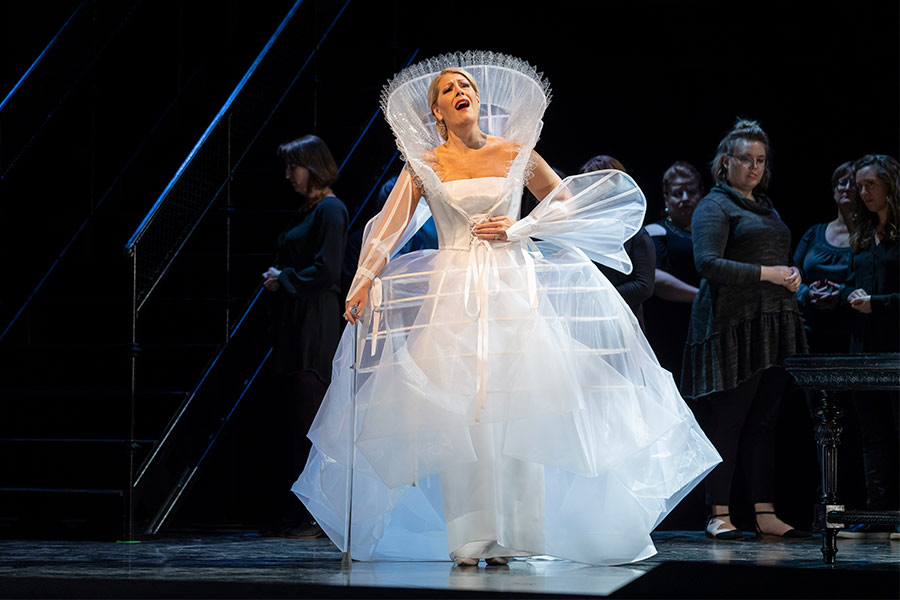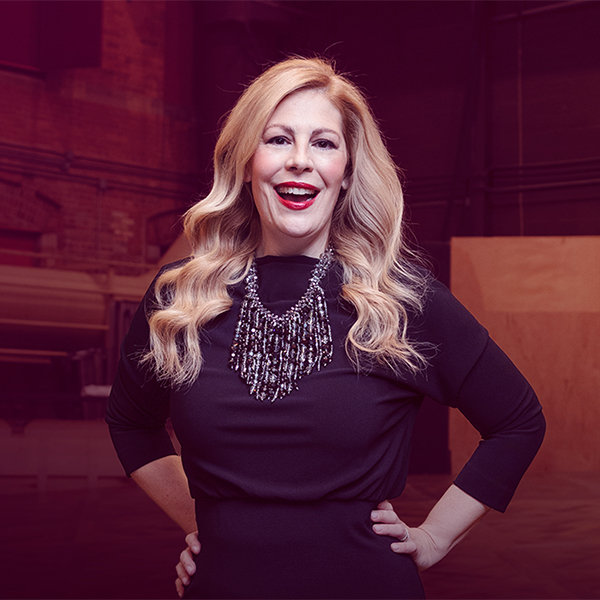December 19, 2024
Longtime love
Early in life, Sondra Radvanovsky was enthralled by the music of Puccini, opera's most romantic composer. Here, she discusses the composer's profound art, and the characters he created.
For someone who has never heard a Puccini opera — or even a Puccini aria — before, can you sum up the appeal of his music that has kept it before the public for more than 130 years?
I'd say to someone who's never been to a Puccini opera, "Be ready to get an ear's worth of music — and you won't be able to get it out of your head!" The tunes Puccini could create are spectacular. To this day, I don't think there's been anyone as masterful in doing that as Puccini. Without a doubt! I was at a rehearsal today that was all Puccini, and I was thinking, "My gosh, this man could write music!'
What do you think are the qualities that make an outstanding Puccini singer, both vocally and theatrically?
A Puccini singer has to have so many facets, not only to their personality but to their voice. You have to act with your voice when you sing Puccini's music. In saying that, what I mean is you need a sob in your voice when you're crying but you also have to be able to show extreme happiness. It's also not enough to sing just what's on the page — though, like Verdi, he did give singers a beautiful road-map in his scores: Every expressive notation is in the score. He left it all there for us as singers to read as a road map. Puccini singers have to express their emotions not just with their physical acting, but also with their voice.
Most of Puccini's operas are verismo, which translates basically to realism. Puccini acting has to be realistic, like everyday-occasion acting — very real, believable, relatable. The audience has to relate to these characters — they're you, they're me, they're normal people, there's no pretense. Tosca — she's me. I'm playing myself onstage. She's an opera singer! OK, maybe Turandot is a bit off the charts, but that story is more like a fairytale. You really have to be in command of your voice and have many vocal tricks up your sleeve, because that's what is needed to display all these emotions.
Do you remember the first music by Puccini that you ever heard?
It was Tosca, which I saw on television when I was 11 years old. It was with Plácido Domingo and Eva Marton. It's the reason why I became an opera singer — Puccini reeled me in with that hook. I was sitting there thinking, "I've never heard anything like this." I thought, "I like what I'm watching. They seem to be having fun!" And then I got this little tingle in my soul; that's the only way I can describe it. I thought, "This makes me happy. Is it the music? Is it the characters? For an 11-year-old, that's a pretty big question. I allowed it to absorb me, I didn't absorb it. I felt afterwards, "Whatever that's called, I want to do that." I remember saying that to my mom, and telling her, "I want to be those people."

Sondra Radvanovsky in The Three Queens at Lyric Opera of Chicago
And when did you see a Puccini opera onstage for the first time?
The first Puccini opera I saw onstage was one I was in, La bohème, when I was 21. I'd quit school. If it isn't for you, find another way into what you want to do! I studied privately, doing probably the equivalent of a bachelor's degree. I just didn't get the piece of paper! I auditioned for Whitewater Opera in Indiana, and I was asked to go to New York to audition with everyone else. I got the role of Mimì — and before I sang that role there, I was a "smoke girl" in Carmen!
What prompted you to create your Puccini concert?
Those who know anything about me know that I like a challenge! For example, doing all three "Donizetti queens" in one season at the Metropolitan Opera, then creating a concert of the finales of those operas — now, that was slightly crazy! So afterwards, Anthony Freud and I were sitting at dinner and he asked, "What do you want to do next? The centenary of Puccini's death is coming up, why don't you do all the arias?" I said, "Yes! I love challenges!"
How did you determine the order that you wanted for the program?
If it's aria, aria, aria, one after another, the audience could get bored and I don't want that. The way we did it was to make it entertaining for the audience. Also, I have to think about my voice and myself. At 55 years old — almost 56 when this concert happens — I really have to consider stamina and vocal placement. Puccini arias aren't all written the same way for the soprano.
What do you hope listeners will take away from this concert?
Honestly, it's for people to hear what Puccini's music really is, and also to not just think about the operatic stage. I mean, how many times have we heard Puccini in commercials, even if it's been in butchered versions of the music? And on elevators? Also, look at Andrew Lloyd Webber — he's been greatly influenced by Puccini. When I was singing the Fanciulla duet, I looked at Jonas Kaufmann and said, "That's Andrew Lloyd Webber" [at one point the music closely resembles Phantom's "Music of the Night"]. You hear Puccini in John Williams's music, too.
I want people to see what a pivotal composer Puccini was in the operatic world, how he changed music, how he changed opera. He was a pioneer of verismo style as well — many followed him. I want people to come away saying, "What beautiful music, what great storytelling," while realizing how ahead of his time he was. It's really breathtaking, the depth and breadth of his music, and at the same time, he pulls on the heartstrings as no other composer does. It's a great concert for bringing someone you love, to feel that passion in his music and his storytelling. It makes you want to believe in love if you don't, because these are great romances and passionate tunes. Even just listening to the music without words, it drips passion!

